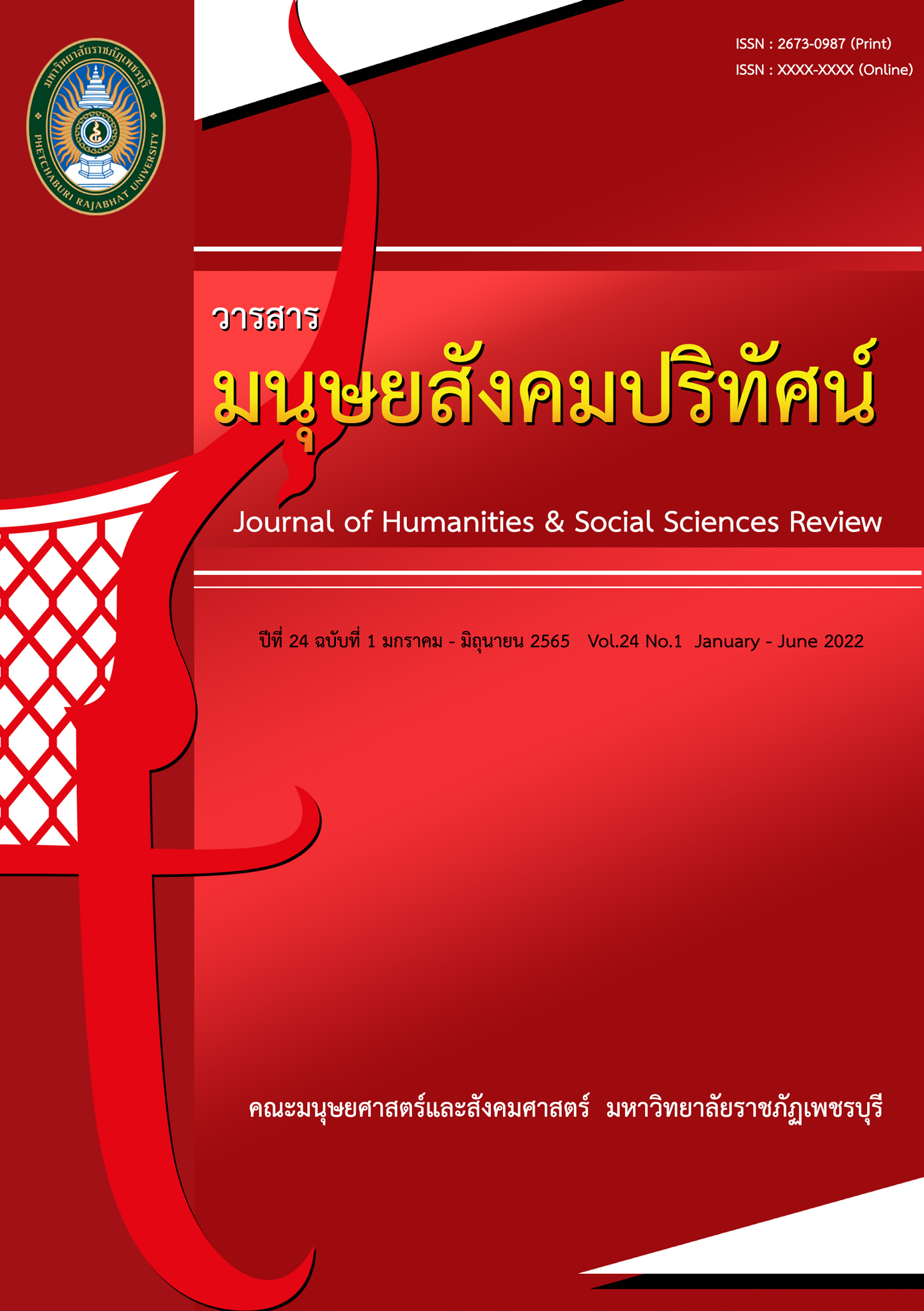Generating Creative Tourism Routes within Phetchaburi through the Innovative use of Local Food Products
Main Article Content
Abstract
At present, there is not a complete understanding of what motivates tourists to travel to a specific food destination. This article aimed to give insights into the various forms of tourism together with the behavioral patterns of tourists and particular implications for integrating local cuisine into tourism in general. In addition, this study aimed to identify the personal motives of potential food tourists and their underlying decision-making processes in selecting preferred destinations. Food is rapidly becoming one of the major attractions for tourists. This exploratory study analyzed and evaluated the particular tastes of different kinds of food, the history, and background of indigenous dishes dining culture and secret tips of local cooking. The review of the relevant studies of culinary tourism and analyzing potential food tourism routes in Phetchaburi were done in order to create tourism products by stimulating and developing local food tourism. The findings showed that not only the understanding of the motivational and other factors from both tourists and destination perspectives but also having regard to sustainable destination management to generate creative tourism routes within Phetchaburi through the Innovative use of local food products.
Article Details
1. Any views and comments in the article are the authors’ views. The editorial board has not to agree with those views and it is not considered as the editorial board’s responsibility. In case, there is any lawsuit about copyright infringement, it is considered as the authors’ sole responsibility.
2. The article copyright belonging to Faculty of Humanities and Social Sciences, Phetchaburi Rajabhat University are copyrighted legally. Republication must be received direct permission from the authors and Phetchaburi Rajabhat University in written form.
References
กระทรวงการท่องเที่ยวและกีฬา. (2560). แผนพัฒนาการท่องเที่ยวแห่งชาติฉบับที่ 2. กรุงเทพฯ: ผู้แต่ง.
______. (2561) รายงานภาวะเศรษฐกิจท่องเที่ยว. กรุงเทพฯ: ผู้แต่ง.
การท่องเที่ยวแห่งประเทศไทย. (2556). แนวคิดในการท่องเที่ยว. กรุงเทพฯ: ผู้แต่ง.
______. (2564). แนวโน้มตลาดการท่องเที่ยว. กรุงเทพฯ: ผู้แต่ง.
กุลวรา สุวรรณพิมล และคณะ. (2547). การศึกษาประสิทธิภาพของการให้บริการในระบบขนส่งในจังหวัดภูเก็ต พังงาและกระบี่. กรุงเทพฯ: สำนักงานกองทุนสนับสนุนการวิจัย.
คณะทำงานขับเคลื่อนเมืองสร้างสรรค์จังหวัดเพชรบุรี. (2563). ตำรับอาหารพื้นถิ่น. สืบค้นเมื่อ 20 กุมภาพันธ์ 2564, จาก https://www.phetchaburicreativecity.com/ตำรับอาหารพื้นถิ่น.
ธีระพันธ์ ปัญญาดี และคณะ. (2564). เส้นทางการท่องเที่ยวเชิงอาหารอย่างสร้างสรรค์ จังหวัดเพชรบุรี. เพชรบุรี: ผู้แต่ง.
ประสิทธิ์ คุณุรัตน์ และคณะ. (2546). (ร่าง) รายงานสรุปสำหรับผู้บริหาร แผนงานวิจัยย่อยเรื่องการศึกษาและสำรวจเส้นทางการท่องเที่ยวในภาคตะวันออกเฉียงเหนือ. (เอกสารอัดสำเนา).
ปิรันธ์ ชิณโชติ และธีระวัฒน์ จันทึก. (2559). รูปแบบการจัดการการท่องเที่ยวเชิงสร้างสรรค์ของสวนผึ้ง. Veridian E-Journal, 9(1): 250-268.
สุนีย์ วัฑฒนายน. (2557). 6 อาหารท้องถิ่น วัฒนธรรมการกินแบบพื้นบ้าน สืบสานสู่อาเซียน. Princess of Naradhi was University Journal of Humanities and Social Sciences, 1(1), 34-44.
องค์การบริหารการพัฒนาพื้นที่พิเศษเพื่อการท่องเที่ยวอย่างยั่งยืน. (2562). การท่องเที่ยวเชิงอาหาร. กรุงเทพฯ: ผู้แต่ง.
Amabile, T.M., et al. (1996). Assessing the work environment for creativity. Academy of Management Journal, 39: 1154-1184.
Avermaete, T., Viaene, J., and Morgan, E. J. (2003). Impact of knowledge on innovation in small food firms. Mededelingen Faculteit Landbouwkundige en Toegepaste Biologische Wetenschappen.
Binkhorst, E. (2006). The co–creation tourism experience. Retrieved March 15, 2021, from http://www.esade.edu/cedit2006/pdfs2006/papers/esther_binkhorst_paper _esade_may_06.pdf.
Boniface, P. (2003). Tasting tourism: Travelling for food and drink. Aldershot: Ashgate.
Cohen, E., and Avieli, N. (2004). Food in tourism attraction and impediment. Annals of Tourism Research, 31(4): 755-778.
Designated Areas for Sustainable Tourism Administration. (2016). Sustainable tourism
management in six designated areas. Bangkok: Author.
du Rand, G.E., and Heath, E. (2006). Towards a framework for food tourism as an element of destination marketing. Current Issues in Tourism, 9(3): 206-234.
Hall, C. M. (2003). Wine food and tourism marketing. New York: The Haworth Hospitality Press.
Hall, M., and Sharples, L. (2003). The consumption of experiences or the experience of consumption? An introduction to the tourism of experiences or the experience of consumption?. In Cambourne, B. (Eds.). Food tourism around the world: Development management and markets. Oxford: Butterworth - Heinemann.
Long, L.M. (2004). Culinary tourism. Lexington KY: The University Press of Kentucky.
Lundvall, B.A. (1992). National systems of innovation: Towards a theory of innovation and interactive learning. London: Pinter Publishers.
Mak, A.H.N., Lumbers, M., Eves, A., and Chang, R.C.Y. (2012). Factors influencing tourist food consumption. International Journal of Hospitality Management, 31(3): 928-936.
McAdams, C.R., Foster, V.A., and Ward, J.T. (2007). Remediation and dismissal policies in counselor education: Lessons learned from a challenge in federal court. Counselor Education & Supervision, 46: 212 - 229.
Schumpeter, J. A. (1934). The theory of economic development: An inquiry into profits capital credit interest and the business cycle. Cambridge: Harvard University Press.
Richards, G. (2010a). Creative tourism and cultural events. Retrieved March 20, 2021, from http://www.docstoc.com/docs/68264727/Creative- tourism-and-cultural-events.
Richards, G. (2010b). Creative tourism and local development. In Wurzburger, R., Aageson, T., Pattakos, A., & Pratt, S. (Eds.). Creative tourism: A global conversation (pp. 78–90). New Mexico: Sunstone Press.
Richards, G., and Raymond, C. (2000). Creative tourism. ATLAS News, 23: 16-20.
Ritchie, J. R., and Crouch, G. I. (2003). A model of destination competitiveness/sustainability: Brazilian perspectives. Retrieved February 25, 2021 from http://www.scielo.br/pdf/ rap/v44n5/v44n5a03.pdf.
Shalini, D., and Duggal, S. (2015). A review on food tourism quality and its associated forms around the world. African Journal of Hospitality Tourism and leisure, 4(2): 1-12.
Siripis Maltika, et al. (2016). Development of travelling routes for gastronomic tourism in western region of Thailand. Bangkok: The Thailand research fund.
Stokes, D., and Wilson, N. (2006). Small business management and entrepreneurship (5th ed.). London: Thomson.
Wolf, E. (2004). Culinary tourism: A tasty economic proposition. Portland OR: International Culinary Tourism Association.
World Tourism Organization. (2012). Global report on food tourism. Madrid: World Tourism Organization.


